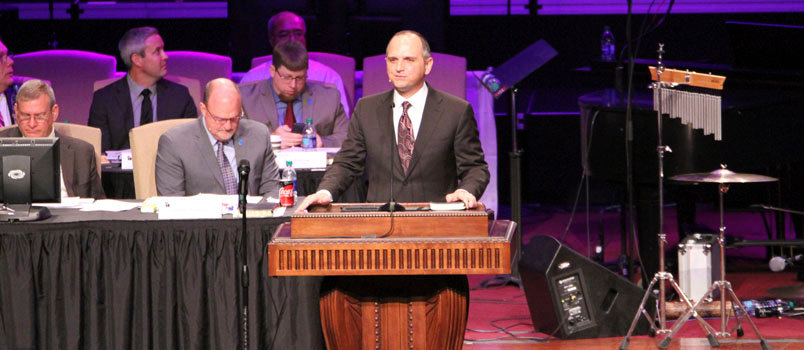 First Baptist Atlanta Senior Associate Pastor Anthony George delivered the Doctrinal Sermon at the Georgia Baptist Convention Nov. 14, at North Metro First Baptist Church in Lawrenceville. MARK STRANGE/GBC Communications
First Baptist Atlanta Senior Associate Pastor Anthony George delivered the Doctrinal Sermon at the Georgia Baptist Convention Nov. 14, at North Metro First Baptist Church in Lawrenceville. MARK STRANGE/GBC CommunicationsLAWRENCEVILLE — Dr. Anthony George, senior associate pastor at First Baptist Atlanta, was the preacher for the doctrinal sermon at the Georgia Baptist Convention annual session this year.
The Tuesday morning business session prior to George’s sermon took up more time than anticipated and by the time he started his sermon the morning session was supposed to be adjourned. So, because he was sensitive to the situation, he graciously condensed his sermon into what became a 12-minute homiletical masterpiece.
Even though many messengers had departed the church’s worship center to attend auxiliary meetings and luncheons George’s audience, weary from the prolonged session, perked up and heard his sermon with great interest. It was brief, but powerful – like a ton of dynamite in a matchbox, like a year’s supply of vitamins in one capsule, or like a gallon of Monster Energy drink in a thimble.
George’s message was “The God Who Can Be Known” and his text was Acts 17:22-31. “When Paul visited Athens,” George stated, “it was in a state of diminished glory compared to its illustrious past.” He spoke of the variety of gods in Athens and how the polytheism of the Greeks led them to be a superstitious people, but indicated that the people were still openly intrigued by new ideas.
The preacher from First Baptist Atlanta stated, “We live in a day of predetermined leftist dogmas, intent on silencing competing worldviews. The bulk of our academic institutions are no longer true to the liberal arts tradition of exposure to multiple schools of thought. Rather than teaching students how to think, we’ve devolved into teaching students what they must think, and eliminating from the curriculum and lectures anything that would challenge the predetermined outcomes. Sadly, these products of the academic socialist assembly line only know what they were told to think, but they have no understanding of why they think that way.”
George continued, “What I love about the Christian worldview is that it is not afraid of exposure to the competition. It welcomes interaction and discourse, because it is superior to all other philosophies and dogmas. It can stand the conflict because it emerges victorious. Paul knew this.
“Solomon said, ‘There is nothing new under the sun’ (Ecclesiastes 1:9-10). Every idea and philosophy in our day is nothing but a warmed up leftover from another time. Whether it’s visions of world peace, idealizing socialism, or cross-dressing, it’s just warmed up leftovers. Or maybe it’s wearing sandals made of hemp, or the legalized craze of inhaling it, drinking earthy coffees and teas, eating vegan, living in a tiny house, going off the grid – all of this is primitive and a microwaved version of what has come before us, no matter how new it feels.”
George spoke of the two opposing views in Athens. There were the Epicureans who sought pleasure as life’s goal; and there were Stoics who magnified reason.
“Paul made three observations,” George declared. “'I noticed that you are very religious. I observed your objects of worship. However, what intrigued me most was your altar to the unknown god.'”
“First of all,” George emphasized, “religion does not make someone acceptable before God.
While the new may appear to be hip and appealing, if the new is merely a replacement for the old, it’s nothing but recycled religion.
George continued, “Secondly, idolatry is a lethal substitute for God. Paul said, ‘I saw the objects of your worship. These are called ‘idols’ by God. Idolatry is the veneration of objects or products created or manufactured by humans.
“Idolatry is also the elevation of what God Himself created above God Himself. It is the worship of the creation rather than the Creator. Idolatry is the worship of a god other than the God of the Bible. God said, “You shall have no other gods before Me’ (Exodus 20:3). Idolatry is deception. Idolatry is demonic. Idolatry is not something about which God is indifferent. God is very clear. It grieves Him and should grieve us.”
George’s final point was, “The true Almighty God can be known. Paul saw the statue to Agnosto Theo, the Unknown God in Athens, but we have a God who can be known. He is the Creator (Acts 17:24). He needs nothing from man, but everything man needs comes from God (v. 25). He is sovereign over all humanity (v. 26). And he is available to all who seek Him (v. 27).
“In verse 30 Paul told the people of Athens that God commands all men to repent, to forsake, to turn around, to leave behind their sins, to forsake their polytheism, their pantheism, their agnosticism, and their atheism.
“In one masterful presentation, Paul refutes every one of the Greek philosophies. In doing so, he reminds us that the Gospel is not just one more philosophy or religion among many. It is the one and only Gospel of Jesus Christ – the one man whom God has ordained to judge the world is the one man who died and was raised.
“If we are going to win Georgia, win America, win our next door neighbor, we have to know what we are winning them from and what we are winning them to.”
George’s message was a beautiful synopsis of Acts 17:22-31 and was powerfully delivered. He left many in his audience wanting more.